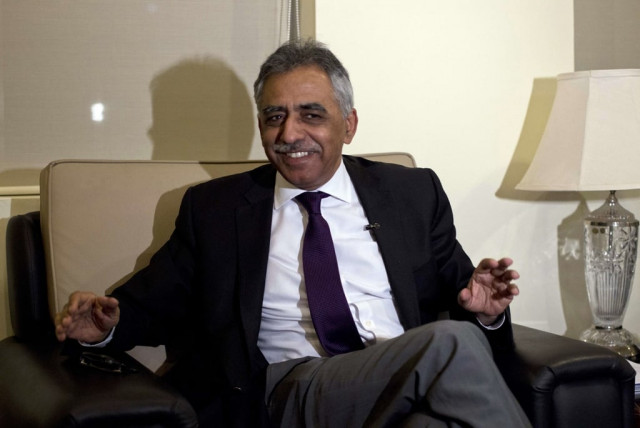Privatisation tsar embarks on quest to revive economy
Mohammad Zubair was on cruise dinner with PM Nawaz Sharif in Thailand when he was offered the hardest job of his life

Chairman of Pakistan's Privatisation Commission Mohammad Zubair speaks during an interview with Reuters at his office in Islamabad January 29, 2014. PHOTO: REUTERS
When the prime minister left the table, a colleague of former IBM executive Zubair rushed to his side.
"Are you mad? Three privatisation ministers have gone to jail and most have corruption cases hanging over their heads," he said. "Don't take this job."
But the country's new privatisation tsar is determined to find buyers for 68 public companies, most of them loss-making, including two gas companies, an oil company, about 10 banks, the national airline and power distribution companies - all within the next two years.
The government sees the sell-offs as a life saver for the $225 billion economy crippled by power shortages, corruption and militant violence. Successful privatisation is Nawaz's top political and economic goal.
"We lose 500 billion rupees annually because of failing enterprises," Zubair told Reuters. "Every day a file lands on a bureaucrat's desk and he has to take a decision he isn't qualified to. This can't go on, no matter what."
Pakistan can raise up to $5 billion in privatisation revenue in the next two years to ease pressure on strained public finance, Zubair said.
Last September, the International Monetary Fund saved the country from a possible default by agreeing to lend it $6.7 billion over three years. In return, Pakistan must make good on a longstanding promise to privatise loss-making state companies.
Privatisation officials, requesting anonymity, said several foreign investors, including the World Bank's private-sector arm, the International Finance Corporation, and the US mutual fund Fidelity Investments have shown interest in the companies.
But for Zubair, a former IBM chief financial officer for the Middle East and Africa, the real challenge is overcoming resistance from thousands of workers who will have to be laid off and opposition parties who are against the plan.
Once a source of pride, Pakistan International Airlines is struggling to stay aloft, having accumulated losses of more than 250 billion rupees. A quarter of its 40 aircraft are grounded. Flights are regularly cancelled and engineers say they have to cannibalise some planes to keep others flying.
Unions strongly oppose the privatisation. The IMF wants the airline partially privatised by December.
Another asset is Pakistan Steel Mills, which has accumulated losses of more than Rs100 billion. Overstaffed by at least three times, employees haven't been paid since October.
An attempt to privatise the mill in 2006 was blocked by the then chief justice. Foreign investment dwindled as deals got caught up in court. Now, under a new Supreme Court chief, officials say the prospects of reform have improved.
'No magic wand'
Under IMF conditions, financial advisers must be hired to evaluate the assets and examine accounts by June.
Zubair's daily work includes visits to opposition lawmakers, parliamentary committees and unions to convince them of his plan. But he has few takers.
"The answer to our current economic malaise lies not in hawking of state-owned institutions but in restructuring these industries," Bilawal Bhutto, patron-in-chief of Pakistan People's Party, wrote in a commentary.
Pakistan Tehreek-e-Insaf MNA and former chief executive of one of Pakistan's largest conglomerates Asad Umar said privatisation was being pursued on an unrealistic time frame and the criteria for identifying entities was inconsistent.
For Umar, it makes no sense that on the list with a bleeding airline are Oil and Gas Development Co Ltd and Pakistan Petroleum Ltd, which made profits of 91 billion and 42 billion rupees respectively in 2013, and have zero debt.
Not all sell-offs are expected to go smoothly.
A nine-year dispute between the government and Etisalat, the United Arab Emirates' largest telecoms firm, over payments from the privatisation of Pakistan Telecommunication Company Ltd, is seen as a discouragement for investors.
But Zubair says no plan is without risk.
"There is no magic wand to ensure that all these ventures will be successful," he said. "But the bottom line is that I'm not going to hold off privatisation for anyone."



















COMMENTS
Comments are moderated and generally will be posted if they are on-topic and not abusive.
For more information, please see our Comments FAQ